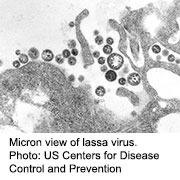
FRIDAY, May 29, 2015 (HealthDay News) — At least 150 people may have had contact with a New Jersey man who died Monday in that state of Lassa fever, but most of them aren’t at serious risk of infection, U.S. health officials reported Thursday.
The unidentified 55-year-old man had returned to the United States on May 17 after traveling to Liberia in West Africa. Lassa fever is a viral disease that’s common in West Africa but rarely seen in the United States. It is nowhere near as infectious as the Ebola virus, which wreaked havoc in Liberia and two other West African nations last year.
Eight of the people at potential risk of infection were on a flight that the man boarded in Morocco after flying from Monrovia, Liberia, the Associated Press reported. The news service said it cited a government official with knowledge of the investigation who spoke on condition of anonymity because the official wasn’t authorized to release information publicly.
The deceased man was only the sixth known case of Lassa fever in a traveler returning to the United States since 1969, according to the U.S. Centers for Disease Control and Prevention.
The last case of Lassa was reported in Minnesota in 2014. There has never been a documented case of person-to-person transmission of Lassa fever in the United States, the CDC added.
The death rate for Lassa is about 1 percent, compared with about a 70 percent death rate for Ebola.
The New Jersey victim arrived at JFK International Airport in New York City on May 17. He did not have any symptoms — such as diarrhea, vomiting or bleeding — when he left Liberia or when he arrived in the United States.
By May 18, the man had a sore throat, fever and tiredness, so he went to a hospital in New Jersey. However, when asked about his travel history, the man did not reveal that he had been in Liberia. He was sent home the same day, but returned to the hospital on May 21 when his symptoms worsened, according to the CDC.
The man was transferred to a treatment center equipped to deal with viral hemorrhagic fevers such as Ebola. Tests revealed the man had Lassa fever, but did not have Ebola. The man, who was kept in isolation, died May 25, the CDC said.
The CDC said those who had close contact with the victim would be monitored for 21 days to see if they develop symptoms of Lassa fever.
Each year in West Africa, there are 100,000 to 300,000 cases of Lassa fever, and about 5,000 deaths from the disease, according to the CDC.
The Lassa virus is carried by rodents and transmitted to people through contact with infected rodents’ urine and droppings. In rare cases, it can be transmitted from person-to-person through direct contact with an infected person’s blood or bodily fluids, or through sexual contact.
Liberia is one of three West African countries — the others are Guinea and Sierra Leone — that were at the epicenter of the 2014 Ebola outbreak, the worst in history.
As of this week, there have been approximately 15,000 laboratory-confirmed cases of Ebola in those three countries, and 11,125 deaths, according to the World Health Organization.
More information
The U.S. Centers for Disease Control and Prevention has more about Lassa fever.
Copyright © 2026 HealthDay. All rights reserved.

